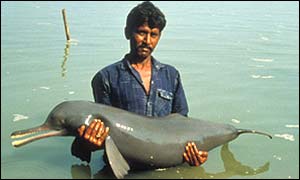AUTHOR: Louise Tillin, BBC News Online
Conservationists working to save India's endangered blind river dolphins say there are encouraging signs that the population is starting to stabilize in some areas.
But there are still many factors which give cause for concern.
It has been illegal to kill the river dolphins since 1972, but until a High Court ruling last year many dolphin poachers went unpunished.
Now, according to Dr RV Sinha, head of the Indian Government's Dolphin Conservation Project, the conservationists' message is starting to get across.
While the dolphin population across India is under 2000, numbers are starting to stabilise in the Vikramshila Gangetic Dolphin Sanctuary – a 50-kilometre (30 mile) stretch of the Ganges in India's eastern state of Bihar.
 |
| The river dolphin was once a common sight (Photo: WDCS) |
Dolphins used to get entangled in the nets used by fishermen in the Ganges.
Many were killed, some accidentally, but others deliberately because fishermen wanted dolphin oil and fats to use as bait.
Last year the Chief Justice of Patna High Court directed the State Government of Bihar to ensure the protection of the dolphin under the 1972 Indian Wildlife Protection Act.
Dr Sinha says that several people have been prosecuted since this order and that "fishermen are now more conscious and more alert".
But the dolphins also face threats from pollution, the erosion and degradation of their habitat and the construction of barrages which mean that the dolphins are confined to certain parts of the river.
The river dolphins are blind – the only species in the world to have eyes without lenses.
They used to be common throughout much of South Asia but over the past century have completely disappeared in some areas.
According to Dr Sinha the dolphins have suffered from a public image problem.
The tiger and elephant have been much more successful in galvanising the attention of the world.
Now he, and other organisations such as the World Wildlife Fund, are hoping to promote eco-tourism as a means of increasing awareness about the dolphins.
But before tourists can be taken to the remote parts of Bihar where the dolphins live, the law and order situation must improve, he says.
SOURCE:
BBC News Online
